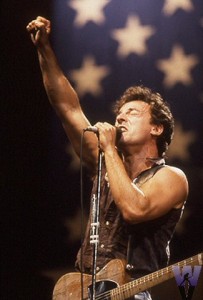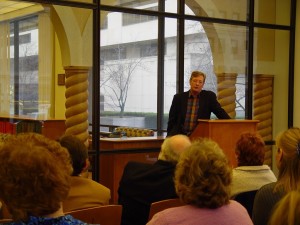by Michelle Gagnon
I wasn’t born in San Francisco, but have made it my home for the past fifteen years (and I’m married to a fourth generation native) So if you’ll be visiting our fair city this week for Bouchercon, here are a few tips:
Sightseeing: What makes San Francisco so unique is its proximity to breathtaking natural settings. If you get a chance, make an excursion to Muir Woods, the redwoods really are astonishing. Or head just across the Golden Gate Bridge to the Marin Headlands for a quick, easy hike and tour of WWII bunkers. Alcatraz is also definitely worth the trip (take the audio tour, it’s great), and offers unparalleled views of the Golden Gate Bridge. But be forewarned, you usually need to book a spot on the ferry a few days in advance.
Closer at hand, one of my favorite spots in the city is Crissy Field. Great views of the bridge from here, too, and there’s an easy walk along the shore where you can watch kite-surfers jetting across the Bay. (Also, there’s a hot dog vendor in front of the warming hut that sells organic all-beef hot dogs: delicious, and a far cry from your average sausage). If you keep following the road around the warming hut, it ends at Fort Point, where in the film Vertigo Kim Novak jumped into the frigid waters. Sticking to the Hitchcock theme, take a cable car up Mason Street from Union Square. At the top of the hill you can visit Grace Cathedral, our miniature version of Notre Dame. And at the intersection of Mason and California is The Brocklebank, a historic building featured in both Vertigo and Bullitt (any other Steve McQueen fans out there?)
San Francisco Landmark s you won’t find in any travel guide: Keep your eyes peeled for “The Twins,” elderly twin sisters who dress in matching hats, dresses, and wigs, frequently spotted strolling arm-in-arm around Huntington Park (across the street from Grace Cathedral—also a great place to see Chinatown locals practicing Tai Chi in the morning).
s you won’t find in any travel guide: Keep your eyes peeled for “The Twins,” elderly twin sisters who dress in matching hats, dresses, and wigs, frequently spotted strolling arm-in-arm around Huntington Park (across the street from Grace Cathedral—also a great place to see Chinatown locals practicing Tai Chi in the morning).
If you’re in the mood for a more serious walk, head to Coit Tower. Interesting art exhibits inside, and great views of the city. Afterwards, walk down the east stairway (on the Bay Bridge side). Halfway down, keep your eyes peeled for the wild parrots of Telegraph Hill, a flock of birds that have escaped their owners (there’s a wonderful documentary and book about the birds).
Restaurants: I love all the restaurants in the Ferry Building, which range from cheap eats to more highbrow fare (there’s a fantastic independent bookstore here too, Book Passage). Try Mijita for the best fish taco you’ve ever had in your life, or the Slanted Door for upscale Vietnamese. Hog’s Oyster Bar makes the best clam chowder on the Pacific coast, Lulu Pet ite sells delicious sandwiches, and Taylor’s Refreshers has milkshakes and burgers. Or grab fixings from the Farmer’s Market and stroll along the Embarcadero to picnic at the base of the Cupid’s Span (Embarcadero and Folsom Street—tough to miss, it’s a sixty-foot tall bow and arrow.) Houston’s along the Embarcadero has fantastic ribs and a cute outdoor patio in back. And granted it’s touristy, but no stay here is complete without eating chowder from a sourdough bread bowl at Fisherman’s Wharf.
ite sells delicious sandwiches, and Taylor’s Refreshers has milkshakes and burgers. Or grab fixings from the Farmer’s Market and stroll along the Embarcadero to picnic at the base of the Cupid’s Span (Embarcadero and Folsom Street—tough to miss, it’s a sixty-foot tall bow and arrow.) Houston’s along the Embarcadero has fantastic ribs and a cute outdoor patio in back. And granted it’s touristy, but no stay here is complete without eating chowder from a sourdough bread bowl at Fisherman’s Wharf.
For French food, try local favorite Café Bastille. This restaurant is located on a cobblestoned alley with a slew of other wonderful restaurants, and they close off the street on Bastille Day for a major fete every year.
Best fish restaurant (and one of the oldest eateries in the city to boot) is Tadich Grill. They don’t accept reservations, so there might be a bit of a wait, but the food and atmosphere is worth it.
Best breakfast: line up at Sears Fine Foods (Powell Street and Post) for a terrific and reasonably priced breakfast. Order the Swedish pancakes, you won’t be disappointed.
North Beach is the place to go for Italian. My personal favorite is Da Flora, a bit pricey but very romantic with its muted lighting and fabulous food. Near the hotel, Town Hall in SoMa is fantastic, and closer to Union Square both Masas and Sons and Daughters are excellent. Tucked away in the Rincon Center is some of the best dim sum you’ll ever have in your life at Yank Sing.
Bars: I kno w, the chances of most attendees leaving the hotel bar are slim. But rest assured, drinks almost anywhere else will be a cheaper option. One of my favorite saloons is Vesuvio, an old beatnik hangout (check out Jack Kerouac Alley which runs along the side of the bar and features an amazing mural, and City Lights Bookstore next door). Right down the street is Toscas, a bar that nearly everyone who has lived in San Francisco for any significant length of time has frequented at least once. There are a lot of decent restaurants along the Embarcadero (running south from the Ferry Building) including Market Cafe and Waterfront Cafe). In my experience, full meals at these eateries is overpriced, but beer and appetizers are reasonable and the views can’t be beat.
w, the chances of most attendees leaving the hotel bar are slim. But rest assured, drinks almost anywhere else will be a cheaper option. One of my favorite saloons is Vesuvio, an old beatnik hangout (check out Jack Kerouac Alley which runs along the side of the bar and features an amazing mural, and City Lights Bookstore next door). Right down the street is Toscas, a bar that nearly everyone who has lived in San Francisco for any significant length of time has frequented at least once. There are a lot of decent restaurants along the Embarcadero (running south from the Ferry Building) including Market Cafe and Waterfront Cafe). In my experience, full meals at these eateries is overpriced, but beer and appetizers are reasonable and the views can’t be beat.
I’m more of a foodie than a shopper (in case that wasn’t already apparent) but the best department stores are all located around Union Square. If you’re looking for something out of the ordinary, right behind City Hall is Hayes Valley, where there are a number of boutiques stocking local designers (most of them are located on Hayes Street itself). Union Street (oddly enough, not located anywhere near Union Square) also has high-end boutiques, but you’ll need to cab there (this would partner well with a Crissy Field excursion!)
Safety: Not the most fun topic to close with, but it bears some discussion. The streets of San Francisco are filled with characters, homeless and otherwise. And there’s generally safety in numbers. That being said, 6th Street is to be avoided at night at all costs. Just a few blocks from the hotel, it’s one of the most dangerous spots in the city (as is Market Street for a block before and after it). Then, when 6th Street crosses Market, you’re entering The Tenderloin, so named because in the past cops who worked that beat received a higher salary, enabling them to bring home a better cut of meat in exchange for putting their lives at risk. And not much has changed. The safest bet at night is to stay fairly close to the area around Union Square, or stick to the streets between the hotel and the Ferry Building. And I recommend taking cabs after dark if you’re going more than a few blocks.
That’s all that comes to mind, but if you have any other questions fire away!
Looking forward to seeing you all!












